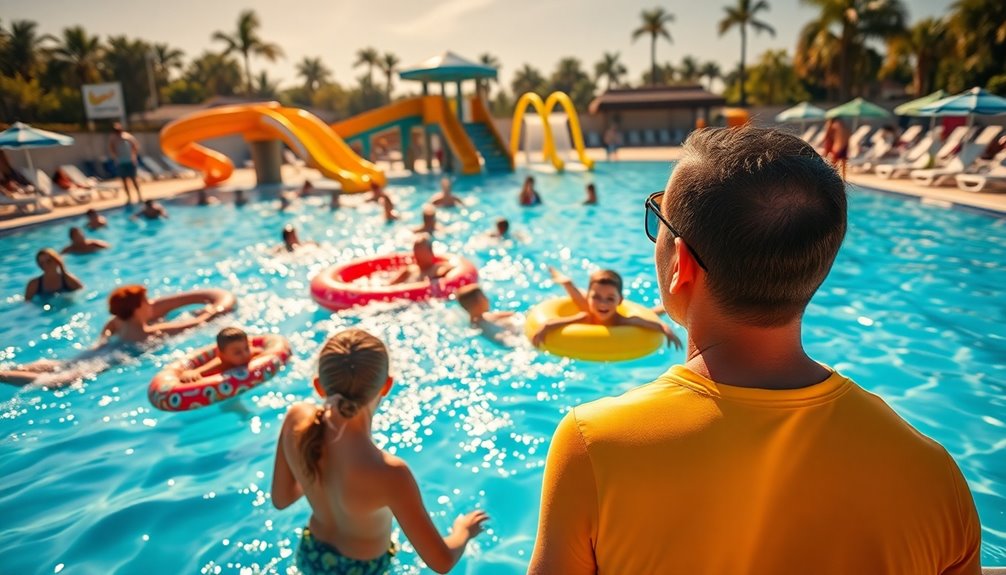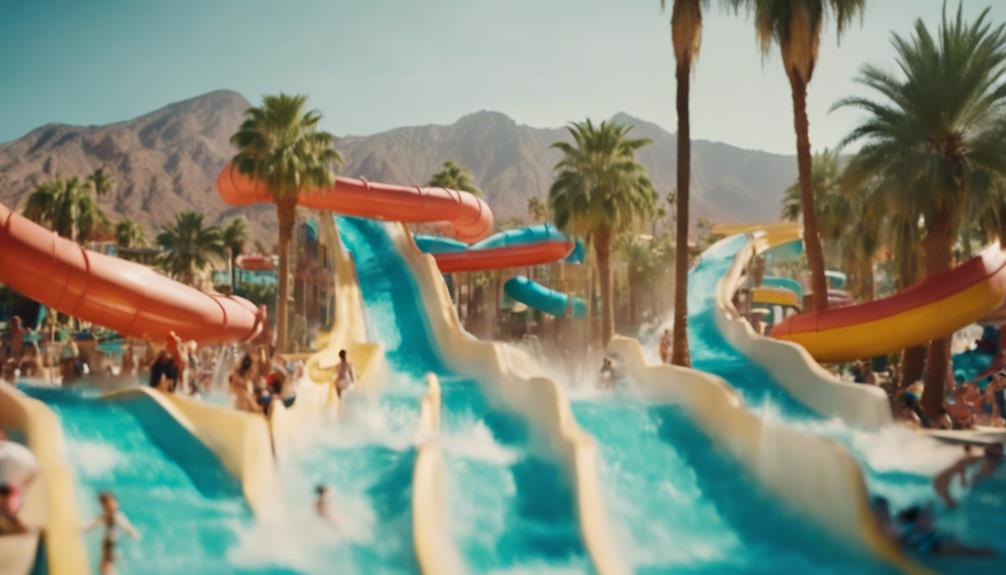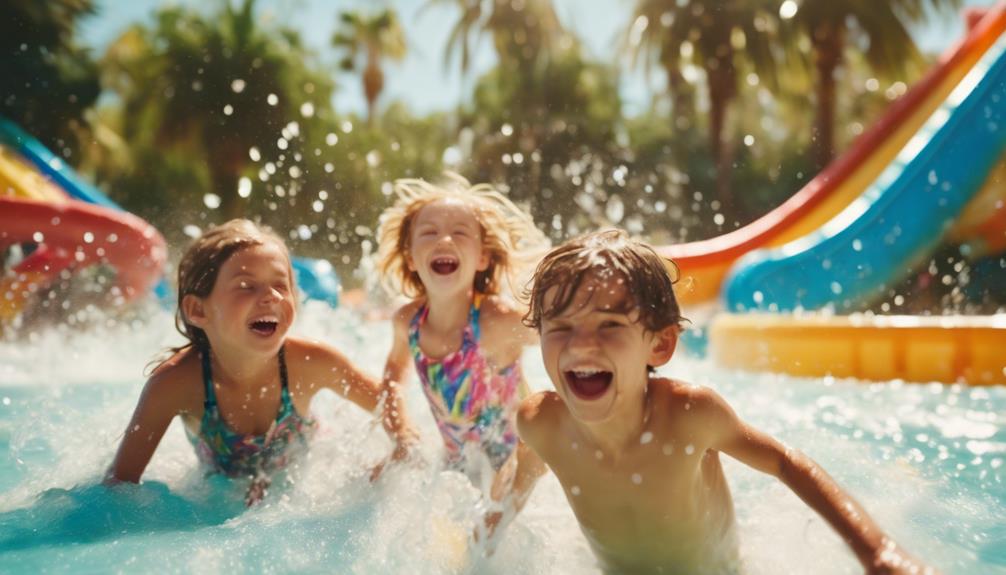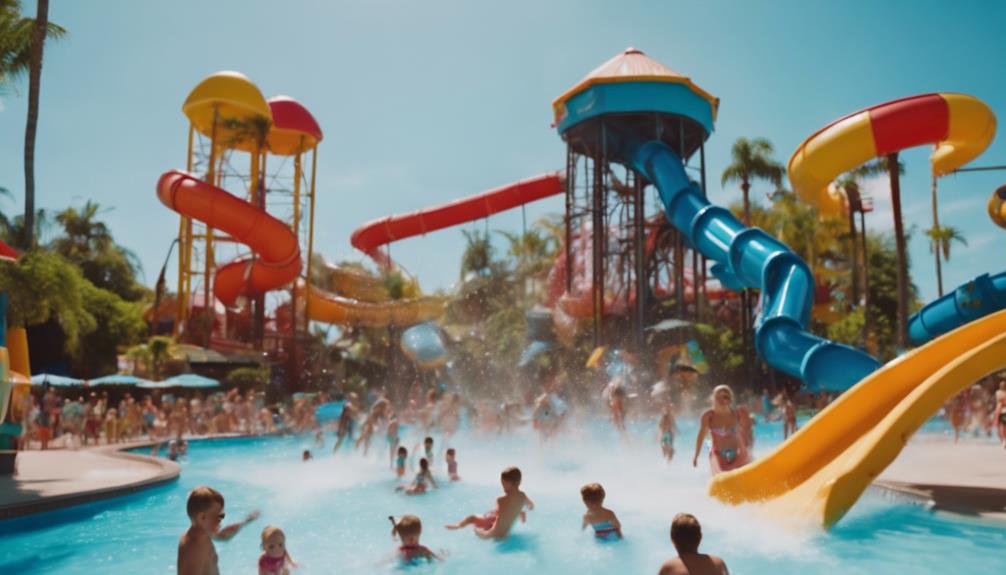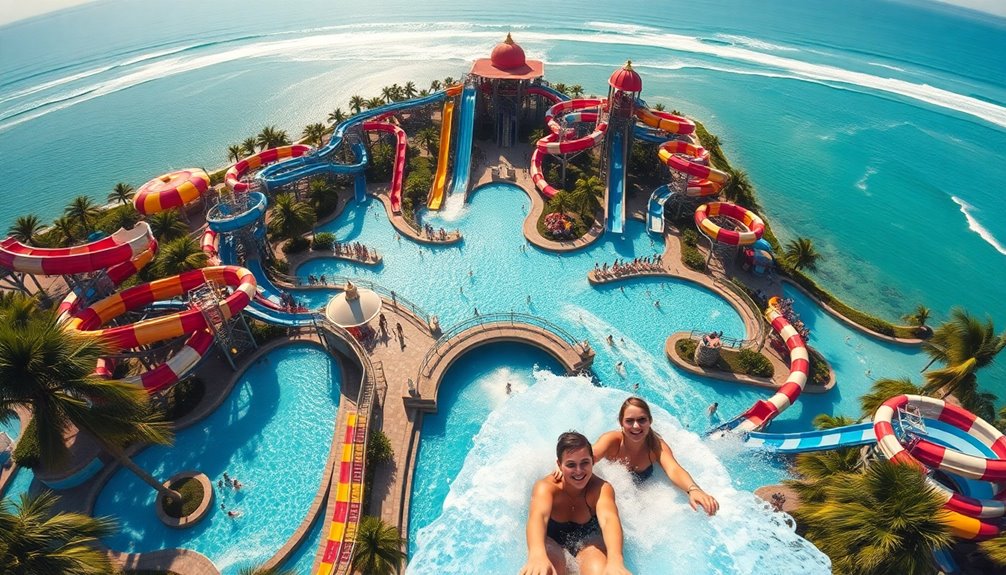Water parks focus heavily on sanitation and safety to ensure a fun experience. They regularly test and treat the water, using chlorine to eliminate harmful microorganisms. To stay safe, shower before entering the pools and use hand sanitizer often, especially before meals. Avoid swimming if you've got diarrhea, and wash your hands thoroughly after diaper changes. Arriving early when crowds are smaller can help you observe hygiene practices better. With these tips in mind, you can enjoy your time without worry. There's plenty more to explore about making the most of your water park visit.
Key Takeaways
- Always shower before and after swimming to maintain personal hygiene and reduce contamination risks.
- Look for signs of water quality issues, such as unusual odors or murky water, before entering pools.
- Use hand sanitizer frequently, especially before eating, to prevent the spread of germs.
- Ensure the park has trained lifeguards and follows proper sanitation and water quality protocols for safety.
- Visit midweek or arrive early to enjoy a less crowded environment and better observe hygiene practices.
Introduction
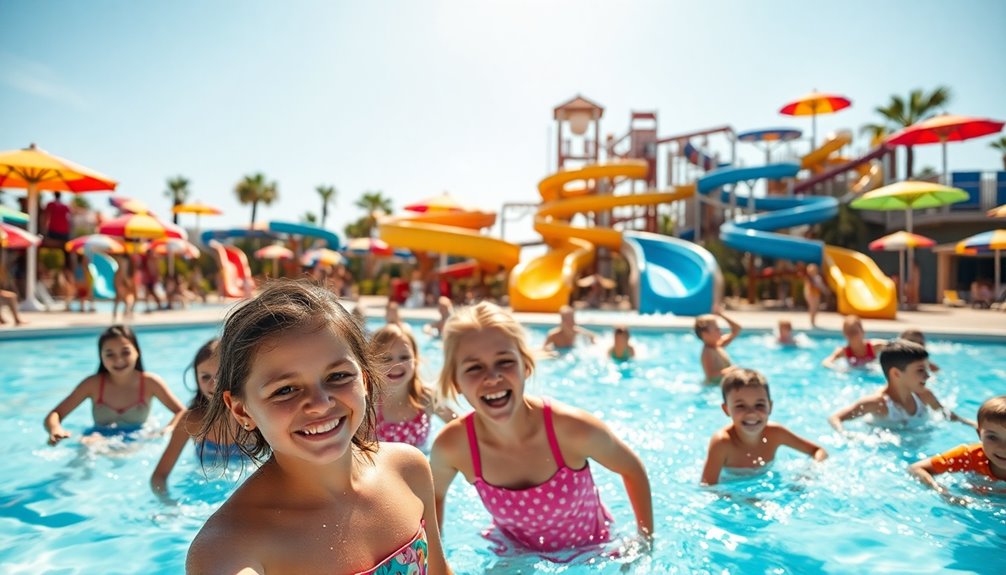
When you think about visiting a water park, sanitation mightn't be the first thing on your mind, but it's crucial for ensuring a safe and enjoyable experience. In recent years, access to proper sanitation and hygiene has become a global concern, impacting health and safety in various settings, including recreational facilities.
While you're looking forward to fun rides and splashes, remember that sanitation plays a vital role in preventing the spread of diseases. In 2017, only 45% of the global population had access to safe sanitation services, which highlights the significance of cleanliness in public spaces like water parks. Without proper hygiene measures, waterborne diseases can spread rapidly, especially among children and vulnerable populations. Safely managed sanitation services are essential to ensure that public facilities, like those at water parks, do not contribute to health risks.
That's why it's essential to stay informed about hygiene practices when visiting. To make the most of your water park experience, familiarize yourself with the facility's sanitation policies. Check if they follow the proper guidelines for water treatment and cleanliness.
Access to clean water and sanitation not only enhances your enjoyment but also protects your health. By prioritizing sanitation, you contribute to a safer environment for everyone at the park.
Unique Wave Pool Experience

When you visit a wave pool, you're not just enjoying the waves; you're surrounded by exciting rides and attractions that enhance your experience. It's important to remember that while you're having fun, the water quality is monitored to ensure sanitation standards are upheld for everyone's safety. Additionally, just as air quality is crucial for a healthy environment indoors, maintaining the cleanliness of the water is essential for your health. Don't forget to explore the dining options nearby to refuel after all that splashing around. Plus, take advantage of the facilities and amenities available, and check out nearby activities to make the most of your day at the water park.
Rides and Attractions
Experience the thrill of a unique wave pool where fun meets water safety. You'll enjoy the exhilarating waves while knowing that maintaining water quality is a top priority.
Waterborne pathogens can contaminate pool water, but regular testing and treatment keep the environment safe. Chlorine and other disinfectants work hard to eliminate harmful microorganisms, ensuring your experience is both enjoyable and hygienic. Reliable access to WASH improves health outcomes and is crucial for preventing waterborne diseases.
Proper filtration systems play a crucial role in removing contaminants, and you can trust that water circulation and turnover rates are carefully monitored. However, it's essential for you to be aware of health risks.
Waterborne diseases, like gastrointestinal infections, can arise from contaminated water, so staying informed is key. While you're splashing around, remember that proper hand hygiene practices can help prevent the spread of diseases.
Be mindful of your surroundings and encourage others to do the same. Regulatory standards, monitored by organizations like WHO, ensure that water parks adhere to health and safety guidelines.
Dining Options
A variety of delicious dining options awaits you at the unique wave pool experience, ensuring you stay fueled for all the fun.
At Philly Up!, you can indulge in classic Philly cheesesteaks, with choices like original chicken or spicy versions to satisfy your cravings after a day of splashing around. The food truck provides a convenient refueling option for guests enjoying the park.
If you're in the mood for a refreshing drink, head over to the Wipeout Bar for specialty cocktails and craft beers, or enjoy the scenic views at the Overlook Bar while sipping on a refreshing cocktail.
Both spots offer a great break from the waterslide action.
For quick bites, Summit Snacks serves up favorites like nachos, hot dogs, and frozen treats, all conveniently located in the main plaza.
Don't forget to save room for dessert! You can choose from a variety of sweet treats at Yukon Yogurt, The Candy Cabin, Soaky Shake Shoppe, and Bee Good Café, ensuring everyone finds something to satisfy their sweet tooth.
With these fantastic dining options, you'll have everything you need to keep the fun going strong!
Facilities and Amenities
Offering a blend of excitement and relaxation, the unique wave pool experience at water parks is a highlight for guests of all ages. These pools create controlled waves, allowing you to enjoy a beach-like atmosphere without leaving the park. You'll find various attractions, from thrilling water slides to fun basketball nets, making it a perfect spot for everyone. Many wave pools come with added amenities, such as on-deck saunas and warm water swirl pools, enhancing your overall experience. Additionally, some water parks feature a full-sized wave pool, ensuring ample space for guests to enjoy.
Safety is a priority, so expect trained lifeguards and specific height and weight restrictions for certain attractions. If you're looking for therapeutic options, some wave pools even feature special sections designed for relaxation and accessibility. Accessibility is also taken into account, with ramps and wheelchair lifts available to ensure everyone can enjoy the facilities. Make sure to check for accessible changerooms and other amenities that cater to your needs.
With all these features, the wave pool isn't just a place to splash around; it's a comprehensive experience designed to provide fun and safety for everyone in your group.
Nearby Activities
When visiting a water park, the unique wave pool often becomes the centerpiece of your day, drawing you in with its inviting atmosphere. Here, you can ride the rolling waves, float leisurely, or challenge friends to a splash battle.
But while you enjoy the fun, remember that safety is key. Before jumping in, check the pool's sanitation measures. Wave pools are designed to mimic ocean conditions, but they can also harbor germs if not properly maintained. Look for signs that indicate the pool's cleaning schedule and water quality. It's essential to be aware that inadequate WASH services can lead to increased health risks, particularly for vulnerable populations due to unsafe water.
You might want to explore nearby activities after a wave pool session. Many parks offer thrilling waterslides, lazy rivers, and even interactive splash areas for younger kids. These attractions not only provide variety but also help break the monotony of just swimming.
Lastly, take advantage of shaded areas or nearby cafes to hydrate and relax. Staying refreshed is crucial, especially under the sun. Enjoy your time, but be mindful of both fun and safety!
Tips for Planning Your Visit
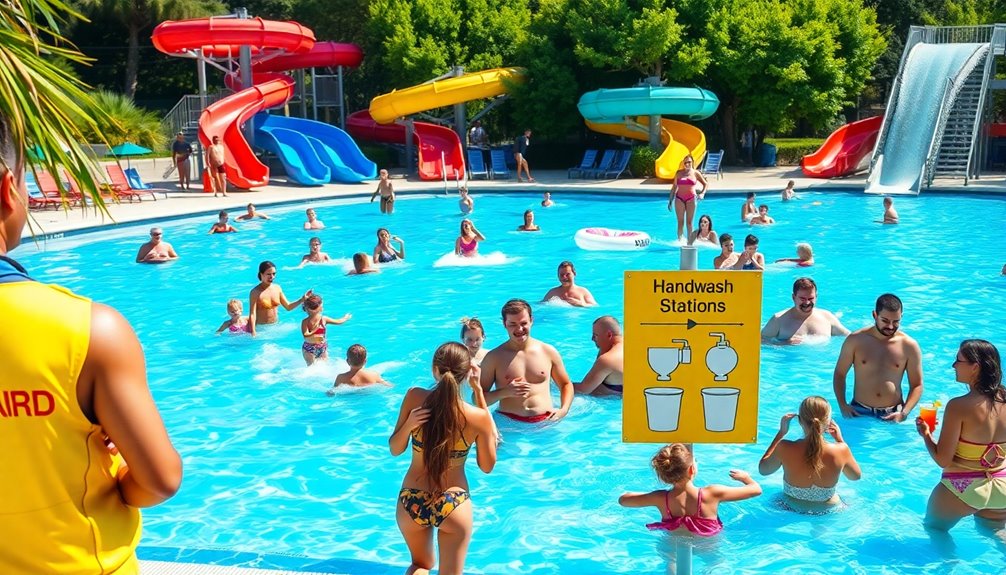
When planning your visit to a water park, consider going midweek to enjoy fewer crowds and shorter lines. Additionally, keep in mind that 703 million people lack access to clean water globally, highlighting the importance of sanitation even in recreational spaces. Many hotels with water parks offer family-friendly amenities that can enhance your overall experience, so be sure to explore your options before booking. Don't forget to apply sunscreen for all-day protection against harmful UV rays. Arriving before the park opens can give you a head start on your favorite attractions and ensure a more enjoyable experience.
Midweek Visits for Fewer Crowds
Choosing to visit a water park midweek can significantly enhance your experience, as you'll encounter fewer crowds and enjoy a more relaxed atmosphere. This not only lowers your risk of waterborne illnesses due to fewer swimmers but also reduces wait times for attractions and facilities. You'll find it easier to observe and follow the park's hygiene practices, minimizing the risk of contamination in pools and water features. Additionally, access to safe water and sanitation should be a priority, as it is essential for maintaining hygiene and preventing disease transmission in public spaces like water parks. Furthermore, ensuring that water parks maintain hygienic practices can help mitigate potential health risks.
To make the most of your midweek visit, aim for early morning or late afternoon, as these times are typically less crowded. Avoid holidays and school breaks for the best experience, and check the park's schedule for events that might attract larger crowds.
It's wise to pre-purchase tickets online to save time, and arrive early to secure parking and enjoy popular attractions first.
If you find peak hours unavoidable, prioritize less popular rides to avoid long waits. Consider scheduling meal breaks during off-peak times for a more enjoyable dining experience.
Sunscreen for All-Day Protection
After enjoying a more relaxed midweek visit to the water park, it's important to safeguard your skin from the sun's harmful rays. Start by choosing a broad-spectrum sunscreen with an SPF of 30 or higher and ensure it's water-resistant for all your aquatic adventures.
Applying sunscreen is similar to the careful preparation involved in a traditional tea ceremony, emphasizing mindfulness and thoroughness. Apply it 15-30 minutes before you head outside; don't skimp on coverage—use enough to cover all exposed areas, including often-overlooked spots like your ears and neck. Close supervision is crucial, especially when children are playing in the water.
Reapply your sunscreen every two hours or immediately after swimming. A spray sunscreen can make reapplication easier, especially for those tricky spots.
If you're bringing kids along, opt for sunscreen specifically designed for their sensitive skin. Apply it before they get dressed and teach them how to reapply it themselves. Sunscreen sticks can be handy for quick touch-ups.
In addition to sunscreen, consider wearing protective clothing like hats and sunglasses, and seek shade during peak sun hours.
Arrive Before Park Opening
To kick off your water park adventure on the right foot, arriving before the park opens can make a world of difference. You'll beat the crowds and minimize wait times, allowing you to enjoy the attractions at your own pace.
Make sure to check the park hours and arrive with enough time to soak in the fun without feeling rushed.
Prepare your essentials ahead of time. Pack sunscreen, water shoes, and reusable water bottles to stay hydrated throughout the day. Ensuring hygiene standards are met by the park can help you feel more secure about your visit.
Familiarize yourself with the park map and attractions so you can prioritize your favorites.
Once inside, take advantage of any efficient queue management systems the park offers. If early bird specials or quick pass options are available, use them to your benefit.
While waiting in line, stay hydrated and consider using this time to reapply sunscreen or take breaks.
Don't forget to have a plan for emergencies — like a list of contact numbers and designated meeting points in case anyone gets separated.
Arriving early sets the tone for a safe and enjoyable day at the water park, ensuring you make the most of your visit.
Seasonal Family Package Deals
Planning a visit to a water park can be exciting, especially when you take advantage of seasonal family package deals. Start by booking in advance and checking various water park websites for special offers.
Compare packages to find the best value, and don't forget to look for discounts on food and merchandise. If you can, consider visiting during off-peak seasons for even lower prices.
Next, carefully review what's included in the package. Are meals and locker rentals part of the deal? Check if parking fees are extra and confirm any additional costs for special attractions.
Look for amenities like cabanas or VIP access, but also pay attention to age restrictions.
Safety's vital, so ensure the park follows strict sanitation protocols and provides life jackets for non-swimmers.
Familiarize yourself with the park's safety regulations and check for designated areas for younger children.
Accommodation Options
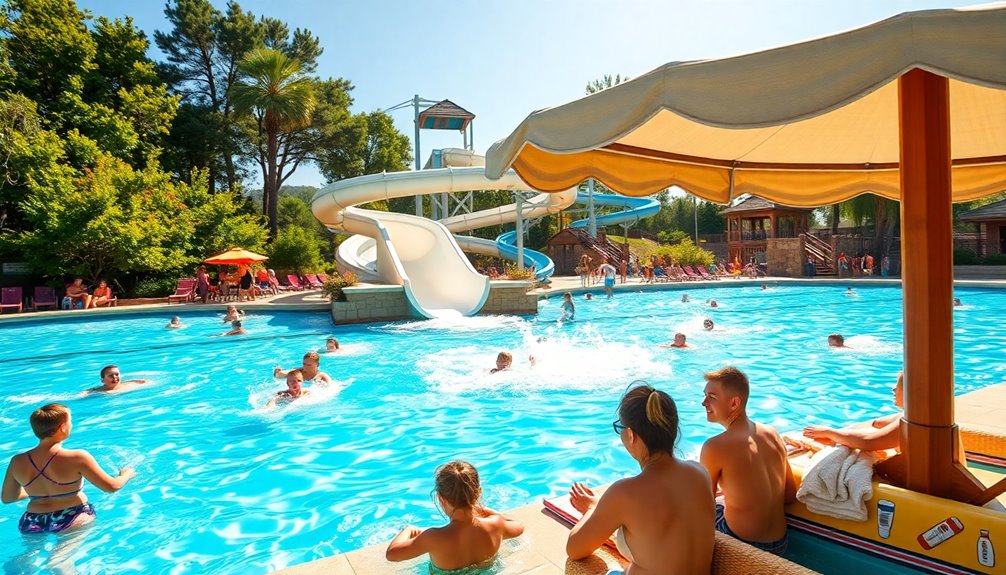
Exploring accommodation options near water parks can significantly enhance your overall experience. When choosing where to stay, consider facilities that prioritize clean drinking water and sanitation. Access to safe drinking water is essential, especially since billions still lack it globally.
Opt for hotels or resorts that provide safely managed water services, ensuring you and your family can drink and use water without worry.
Sanitation facilities are equally important. Look for accommodations that maintain hygiene standards, offering clean restrooms and handwashing stations. This not only keeps you comfortable but also helps prevent the spread of diseases that can arise from inadequate sanitation.
You should also check if the location promotes proper hygiene practices, like providing soap and water for handwashing. Staying somewhere that emphasizes cleanliness can make your trip safer and more enjoyable, especially for young children who are particularly vulnerable to waterborne diseases. Additionally, ensuring that your accommodation has hygiene standards can help minimize the risk of infections from unsterilized tools and surfaces.
Insider Tips
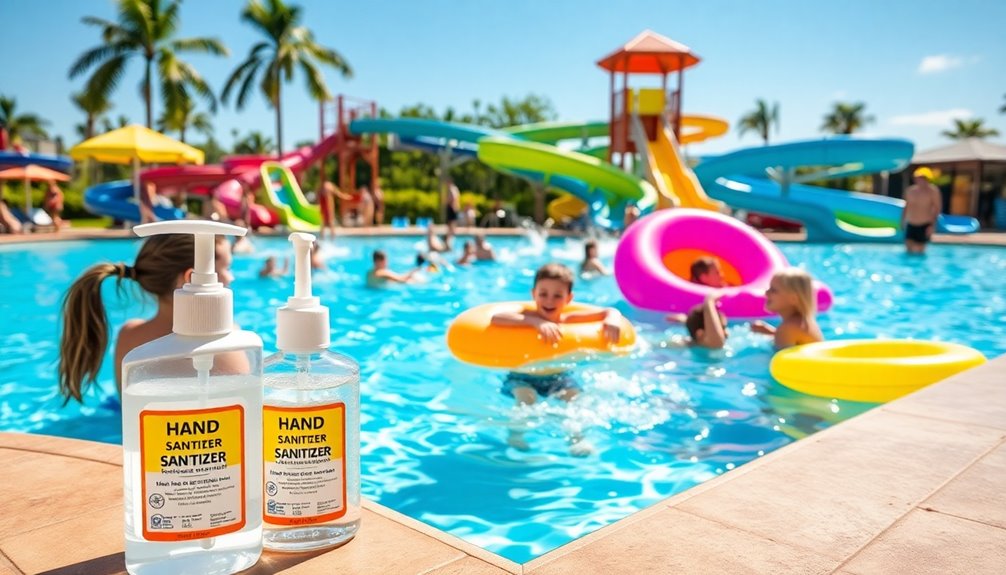
Choosing the right accommodation can set the stage for a great water park experience, but knowing some insider tips can elevate your visit even further.
First, always check the water park's cleanliness ratings online before you go. Look for reviews that mention water quality and maintenance.
When you arrive, pay attention to the staff's hygiene practices, such as handwashing and equipment sanitation. These indicators can give you a sense of how seriously the park takes cleanliness. Many parks also implement effective water management strategies to maintain hygiene.
Don't hesitate to ask staff about their water management strategies; responsible parks will be transparent about their safety measures. Effective management is crucial because access to safe water is a fundamental human right that supports health and well-being.
Also, make sure to keep your own hygiene in check. Use hand sanitizer frequently, especially before eating or after using restrooms. Encourage your kids to rinse off before jumping into the pools.
If you notice any signs of contamination—like unusual odors, murky water, or excessive crowding—consider taking a break or moving to a different area.
Lastly, plan your trip during off-peak hours for a more enjoyable experience, as this often means cleaner facilities and shorter lines.
With these insider tips, you can maximize your fun while staying safe!
FAQs About Water Safety Practices
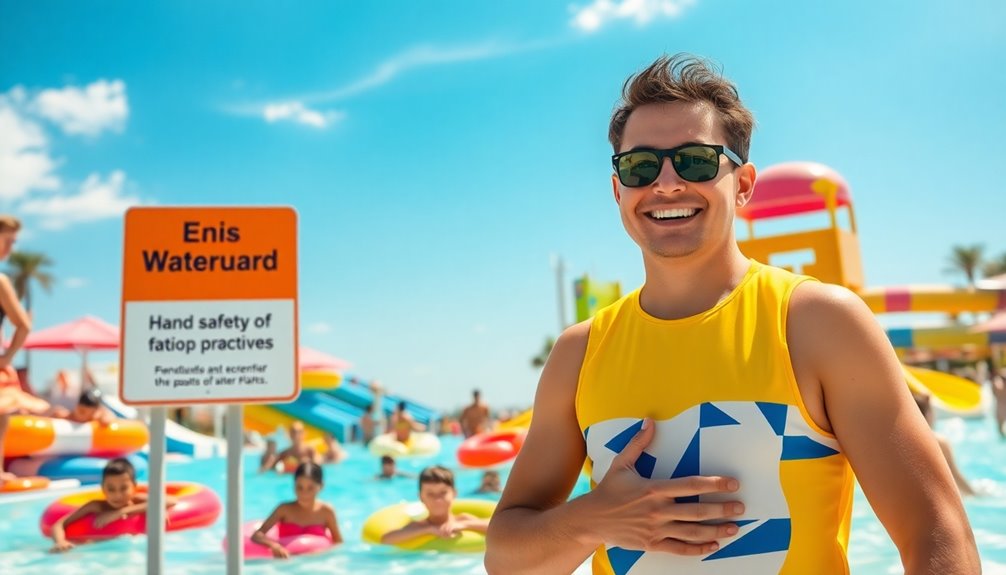
Water safety practices are crucial for ensuring a fun and healthy experience at water parks. You might wonder how waterborne illnesses are prevented. Regular inspections and maintenance of water quality and equipment play a significant role. Water parks implement schedules with licensed professionals to ensure cleanliness and safety. Additionally, adherence to strict safety standards is essential to help minimize risks associated with waterborne pathogens.
Swimmer hygiene is just as important. Always shower before and after swimming, and avoid swimming if you have diarrhea. Remember not to swallow pool water, and change diapers in designated bathroom areas—washing your hands thoroughly afterward is a must.
Effective disinfection procedures are vital. Staff should disinfect all surfaces, including pool water, railings, and lounge chairs, using skin-safe disinfectants. Understanding the dwell times for various disinfectants helps prevent the spread of germs, as effective disinfection is essential in all operational areas.
Operational safety is paramount too. Make sure staff is trained to maintain pH levels and disinfectants. Learn to recognize signs of a contaminated pool—murky water or a strong chlorine smell can be red flags. Regular inspections conducted by health departments further ensure that safety protocols are consistently followed.
Additionally, rigorous safety protocols ensure a safe environment for everyone, especially children. Always stay informed and follow the guidelines for a worry-free water park experience!
Final Thoughts
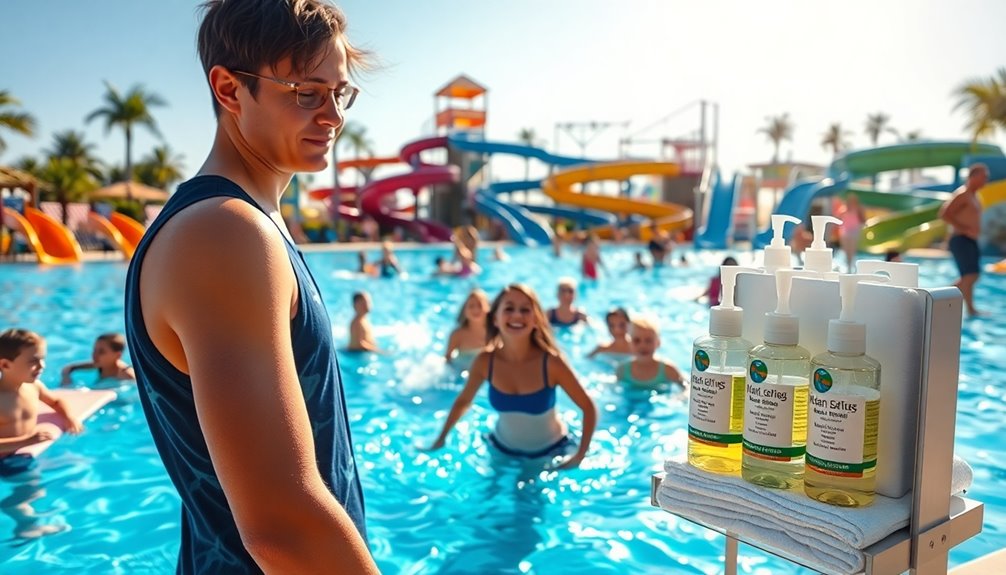
When it comes to enjoying a day at the water park, keeping sanitary practices in mind is essential for your health and safety. Despite advancements, millions worldwide still lack access to safely managed sanitation services. This reality highlights the importance of being proactive in ensuring your own well-being.
Water parks can harbor health risks, especially if hygiene practices aren't strictly followed. Unsafe water and inadequate sanitation can lead to infections like diarrhea and cholera, which are especially concerning for young children.
As you enjoy the attractions, be mindful of your surroundings, and take necessary precautions like washing your hands frequently and avoiding swallowing water. Additionally, maintaining good air quality can also enhance your overall experience and reduce health risks associated with crowded indoor spaces.
Remember, while water parks strive to maintain cleanliness, the responsibility also rests on you. By recognizing the disparities in global sanitation challenges, you can appreciate the importance of safe practices at these venues.
Ultimately, your experience can be enjoyable and safe if you stay informed and vigilant. Prioritize your health, and encourage others to do the same, ensuring that everyone can have a fun day at the water park without compromising safety.
Frequently Asked Questions
How Often Are Water Park Pools Cleaned and Treated?
Water park pools get cleaned daily, with surface skimming and chlorine checks, while vacuuming and filter cleaning happen weekly. Deep cleanings occur bi-monthly, ensuring a safe and enjoyable experience for you and other guests.
Are Lifeguards Trained in Sanitation Procedures?
Yes, lifeguards are trained in sanitation procedures. They learn to identify water quality issues, monitor chlorine levels, and ensure proper hygiene practices among swimmers, all to maintain a safe environment for everyone enjoying the water.
What Are Common Germs Found in Water Parks?
You might encounter germs like E. coli, Shigella, and Cryptosporidium at water parks. These pathogens can cause serious gastrointestinal and respiratory issues, so staying informed about potential risks is essential for your health and safety.
Can Water Park Attractions Spread Infections?
Yes, water park attractions can spread infections. Contaminated water, poor hygiene among visitors, and crowded conditions increase risks. You should always practice good hygiene and be aware of your surroundings to minimize exposure to germs.
Do Water Parks Provide Any Sanitation Supplies for Guests?
Yes, water parks provide sanitation supplies like shower facilities, restrooms stocked with soap, and hand sanitizers for guests. You'll find signs encouraging hygiene practices, ensuring a cleaner environment and a safer experience for everyone.
